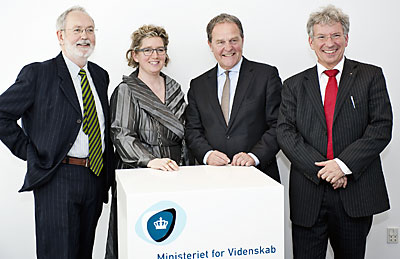Bavaria Interested in Danish Top-Level Research
This week, Federal State Minister Dr. Wolfgang Heubisch, Bavarian State Ministry of Sciences, Research and the Arts, is visiting his Danish colleague, Charlotte Sahl-Madsen, Minister for Science, Technology and Innovation, together with a number of prominent German researchers.
One of the areas of particular interest to the Federal State Minister Dr. Wolfgang Heubisch, Bavarian State Ministry of Sciences, Research and the Arts, is four promising research environments (known as UNIKs), which have received a total grant of DKK 500 million (EUR 67 million) for creating breakthrough results.
The Federal State Minister Dr. Wolfgang Heubisch, Bavarian State Ministry of Sciences, Research and the Arts, would also like to strengthen collaboration between the Bavarian research facility FRM II and the Scandinavian "European Spallation Source" (ESS). The main location of ESS will be at Lund, Sweden, while Denmark will host the central data and computer centre for processing and analysing the large volumes of data generated by ESS.
– International contacts are crucial for Danish researchers to keep abreast of the best international environments and take part in the best international projects – and this is also essential to Danish knowledge-intensive enterprises. I look forward to seeing more results of the international alliances we have now made, says Science Minister Charlotte Sahl-Madsen.
The visit by the Federal State Minister also provides the framework for a cooperation agreement between ESS in the Øresund region and the Bavarian research facility FRM II.
In the presence of Science Minister Charlotte Sahl-Madsen and Federal State Minister Dr. Wolfgang Heubisch, Bavarian State Ministry of Sciences, Research and the Arts, ESS and the Bavarian research facility FRM II will sign a cooperation agreement. The agreement means that it will be possible for researchers in the Øresund region to work together with leading neutron researchers at FRM II in Bavaria. This collaboration will ensure that ESS can be developed in cooperation with Europe's leading research environments.
Representatives of the press are welcome to attend the signing of the agreement.
Bredgade 43 in Conference Rooms A and B
Wednesday 28 April 13.30-14.00 hours
Afterwards it will be possible to put questions to those present.
Further comments
Science Minister Charlotte Sahl-Madsen can be contacted via the Ministry's press officer, Charlotte Holst, phone +45 22 11 02 00 or chhh@vtu.dk.
For contacting Federal State Minister Dr. Wolfgang Heubisch, Bavarian State Ministry of Sciences, Research and the Arts, and further information on FRM II, please call Søren Stauning, Technology and Research Attaché at Denmark's Innovation Centre in Munich, phone +49 89 5458 5421, sost@fi.dk.
For information on ESS, please contact Chief Consultant Morten Scharff, phone +45 72 26 55 30, msc@fi.dk.
For information on the UNIK initiatives, please contact Chief Consultant Trine Bendix Knudsen, phone +45 72 26 56 12 , tbk@fi.dk.
Facts:
FRM II:
The neutron source FRM II is a research centre under the Technical University Munich (TUM), headed by Prof. Dr. Winfried Petry. More than 20 German scientific organisations participate as partners in FRM II, including the Jülich Research Centre, the Max Planck Society, Munich's University Hospital, and another ten different universities. The neutron source was inaugurated in 2004 and is used partly in basic research and partly for application-oriented purposes such as radiation technology, medicine (e.g. tumour radiation), radiography/tomography, materials science and catalysis, as well as molecule and structural analysis. In addition, FRM II is the world's most powerful positron source, a technique used for instance in clinical diagnosis (Positron Emission Tomography, or PET scanning).
UNIK:
A UNIK (UNiversitetsforskningens InvesteringsKapital / Investment Capital for University Research) will typically consist of a number of research projects closely interlinked by a common theme, involving researchers who work across a common organisational structure. The four UNIKs deal with subjects as different as synthetic biology, the human brain and spirit, storage of renewable energy, and the relation between food, exercise, medicines and lifestyle diseases. The purpose of the Bavarian Minister's visit to Denmark is, among other things, to make agreements on future collaborations with Danish UNIK top-level researchers.
Document Actions